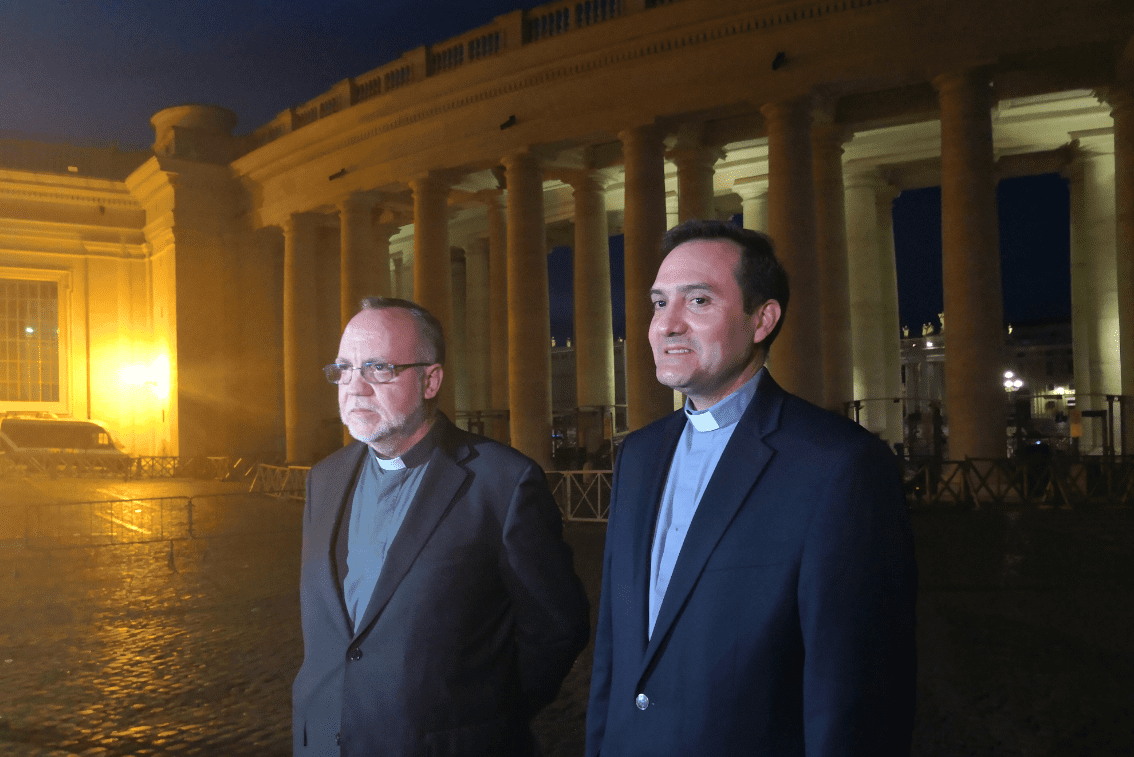ROME– After meeting with Pope Francis for more than four hours, a second group of Chilean sex abuse victims, joined by priests who’ve supported them for 20 years, said they’re “trustful and hopeful” about reforms he’s begun in their Church, where new allegations of clerical sexual abuse arise virtually every day.
Francis met the nine Chileans, two of them laity, on Saturday. Of the seven priests, five are victims of the country’s most notorious pedophile priest, Father Fernando Karadima. It hasn’t been announced which ones in the group are victims of sexual abuse versus abuses of power and conscience.
The group is staying in the Santa Marta, the residence on Vatican grounds where Francis has lived since the beginning of his pontificate.
“Having spoken with the Holy Father and seeing the renewal through a synodal path that he’s undertaken, we are completely trusting and hopeful about what he’s doing,” said Father Eugenio de la Fuente, one of Karadima’s victims.
“He apologized in the name of the Church for what was done to us,” said Father Francisco Astaburuaga Ossa. “That’s very comforting, and also shows the great humility of the Holy Father to, once again, ask for forgiveness.”
Two priests spoke to journalists in Rome on Saturday night, not long after finishing their meetings with the pope. They said Francis spent over four hours with them, first saying Mass for them, then holding individual meetings, followed by a group meeting.
This was the third, and presumably the last, meeting between Francis and the protagonists of the current Chilean crisis. The other two, in late April and mid-May, included three lay survivors of Karadima’s abuses and the entire Chilean bishops’ conference.
At the end of the session with bishops, the prelates presented their resignations en masse to the pope, who still hasn’t officially accepted any of them.
Last Thursday, the Vatican announced that Francis is sending two representatives back to Chile, this time exclusively to Osorno, the diocese to which the pontiff appointed Bishop Juan Barros in 2015.
Barros has been accused of covering up for Karadima, his mentor. Barros has denied the allegations repeatedly, but he’s also presented Francis with his resignation at least twice before arriving in Rome. Sources have told Crux that it’s already been accepted, but no announcement has been made.
“An important thing that he said was that he wanted the entire country to read the letter that he sent [on Thursday], so that the entire believing people is co-responsible for reform, transformation and healing of the Church, not only the priests or the hierarchy, but all the faithful too, the laity,” Astaburuaga said.
“The ecclesiology of the Second Vatican council, in Lumen Gentium, invites the entire people of God to be builders of the Church,” he added. “And the hierarchy is understood in relation to the People of God. The ministers come from the people of God, and they’re at their service.”
De la Fuente said that he came to Rome with three sentiments: gratitude for being invited, consolation for meeting Peter, and hope.
“I have to say that I can confirm these three were met beyond my expectations,” de la Fuente said.
“[I was] totally understood by an empathic person who suffered with my pain. [There’s] great hope because I see that he has an ample, very deep comprehension of the problem,” he said, adding that even though he didn’t reveal them, the pope clearly has decided the short-, mid-, and long-term measures that need to be taken.
The pope listened with a lot of attention, Astaburuaga said, and this renews hope [that the Church will] continue to listen to, and to accompany, survivors. Astaburuaga has done so for the past 20 years, and two of the victims who met with the pope in April have acknowledged this much in public.
Listening and accompanying survivors, he said, is “fundamental.”
A personal conversion is needed, the priest said, because society is not changed because the leadership changes, but because the base does.
“This is a job for everyone,” he said. “This is why the pope keeps talking about the people of God, as understood by Vatican II. We’re all responsible. This is a task for everyone, not for one.”
De la Fuente also said that, having had a hard time both as a young man and then as a priest – he joined the parish run by Karadima at a young age – he wanted to underline his conviction that Jesus Christ really is the life of the human person.
“I can confirm this time and time again: following Christ is what gives us the fullness of life, and the Church is the olive tree where we find Jesus Christ.”
“It’s wonderful that the pope, when he sees a long crisis in the Church that has led to the name of God being used to abuse, wants to correct it so the Church can again become a place of welcome where one can find Jesus, who’s life.”










